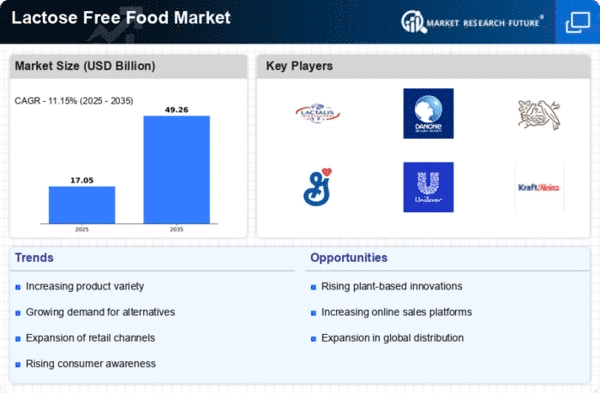Top Industry Leaders in the Lactose Free Food Market

The competitive landscape of the lactose-free food market is dynamic and evolving, reflecting the increasing demand for dairy alternatives driven by rising lactose intolerance awareness and changing consumer preferences. Key players in this market have implemented various strategies to gain a competitive edge.
Prominent companies like Nestlé, Danone, and Valio have established themselves as leaders by leveraging their extensive product portfolios and global presence. These industry giants have developed an array of lactose-free products, including milk, yogurt, and cheese substitutes, to cater to diverse consumer needs. Nestlé, for instance, has successfully introduced lactose-free versions of popular brands like Nesquik and Carnation, enhancing its market share.
Strategies employed:
Strategies adopted by these key players often revolve around innovation, product diversification, and strategic partnerships. Many companies invest heavily in research and development to create innovative lactose-free formulations that mimic the taste and texture of traditional dairy products. Additionally, strategic collaborations with health and wellness organizations or endorsements by nutritionists have helped build trust and credibility among consumers.
factors for market share analysis:
Factors influencing market share analysis in the lactose-free food sector include brand recognition, product quality, pricing strategies, and distribution networks. Established brands with a reputation for delivering high-quality lactose-free products tend to dominate the market. Competitive pricing and effective distribution channels contribute to broader consumer accessibility, influencing market share positively.
emerging companies:
Emerging companies are also making significant strides in the lactose-free food market, challenging established players. Brands like Califia Farms, Daiya Foods, and Ripple Foods have gained traction by offering innovative plant-based alternatives. These companies focus on catering to not only lactose-intolerant consumers but also those seeking plant-based and vegan options, expanding their market reach.
The industry has witnessed notable mergers and acquisitions as companies aim to strengthen their market position. For example, Danone's acquisition of WhiteWave Foods allowed the company to expand its portfolio with popular lactose-free and plant-based brands like Silk and So Delicious. Such strategic moves enable companies to broaden their product offerings and capitalize on the growing demand for lactose-free alternatives.
industry news:
Recent industry news indicates a heightened emphasis on sustainability and eco-friendly packaging within the lactose-free food market. Consumers are increasingly drawn to brands that demonstrate a commitment to environmental responsibility. Companies incorporating sustainable practices and utilizing eco-conscious packaging materials are gaining favor among environmentally conscious consumers, further shaping the competitive landscape.
Investment trends in the lactose-free food sector highlight a surge in funding for startups specializing in plant-based alternatives. Venture capital and private equity firms are keenly investing in companies developing innovative lactose-free and dairy-free solutions. This influx of capital allows emerging players to scale up production, enhance marketing efforts, and expand their market presence.
Overall, the competitive scenario in the lactose-free food market is marked by a delicate balance between established players and innovative newcomers. Key players maintain dominance through extensive product lines, global reach, and strategic partnerships. Meanwhile, emerging companies focus on niche markets, plant-based offerings, and sustainability to carve out their share of the growing lactose-free food industry. With the ongoing shift in consumer preferences towards healthier and sustainable options, the competitive landscape is expected to witness further evolution and new entrants, shaping the market's trajectory in the coming years.
Competitive Landscape:
General Mills Inc. (U.S.),
Arla Foods (Denmark),
Galaxy Nutritional Foods Inc. (India),
Land O'Lakes, Inc. (U.S.),
WhiteWave Foods (U.S.),
Barry Callebaut (Switzerland),
Amy's Kitchen (U.S.),
Daiya Foods (Canada),
Dean Foods (U.S.), and
Fonterra Co-operative Group Limited (New Zealand).












